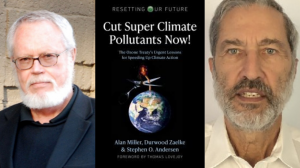Not So Clean Country Air
Climate Change experts/authors Durwood Zaelke and Alan Miller Weigh In On New Pollution Study
Lays out an absolutely essential part of initial climate action in the US and other countries. Climate policymakers need to read this book, now.”
WASHINGTON, DC, USA, February 3, 2022 /EINPresswire.com/ -- The old story about how fresh clean country air is healthier, is being scrutinized, via a new pollution study courtesy the University of Illinois. The study examines how the air pollution in rural areas could be just as toxic as larger cities and regions.— James Gustave Speth, former chair, US Council on Environmental Quality
Because pollution particles in urban areas tend to be larger than those in the country and outlying areas, it makes urban air pollution worse and more intense, we often overlook the pollution in less populated areas.
But the recent study, reported on by NPR outlet KCUR in Kansas City, has shown that while the particles in rural areas are smaller, those pollution particles can be twice as toxic, despite their size.
Climate experts Durwood Zaelke and Alan Miller, authors of the critically important book Cut Super Climate Pollutants Now!, are weighing in about the important significance of this critical study.
According to Miller and Zaelke, “ The recent discovery that pollution particles in the air may differ in their toxicity shows why the EPA needs broad powers to regulate based on evolving scientific knowledge. The Clean Air Act was originally passed in 1970 and has been read by courts as vesting the EPA with broad authority, consistent with the “sweeping” language defining “air pollution” – the holding of the Supreme Court in the 2007 case Massachusetts v. EPA. This seemingly settled principle is, however, soon to be reconsidered by the Supreme Court in a challenge to EPA’s authority to regulate greenhouse gas emissions. The newly activist conservative Court members, led by Justices Gorsuch and Kavanagh, have called for restricting the power of agencies to actions specifically authorized by Congress. The result would devastate the EPA’s ability to address climate change – and perhaps even to address air pollution based on its toxicity.”
As experts in the field ask Mr. Zaelke and Mr. Miller about:
What steps need to be taken by the current political administration to address these types of findings?
What are the keys to the average person becoming more aware of Super Climate Pollutants and pollution in general?
How can the general population impact environmental change and reduce pollution on an individual level
Ryan Levey/Shaili Priya
Allen Media Strategies
+1 703-589-8960
email us here
Visit us on social media:
Facebook
Twitter
LinkedIn
Legal Disclaimer:
EIN Presswire provides this news content "as is" without warranty of any kind. We do not accept any responsibility or liability for the accuracy, content, images, videos, licenses, completeness, legality, or reliability of the information contained in this article. If you have any complaints or copyright issues related to this article, kindly contact the author above.

